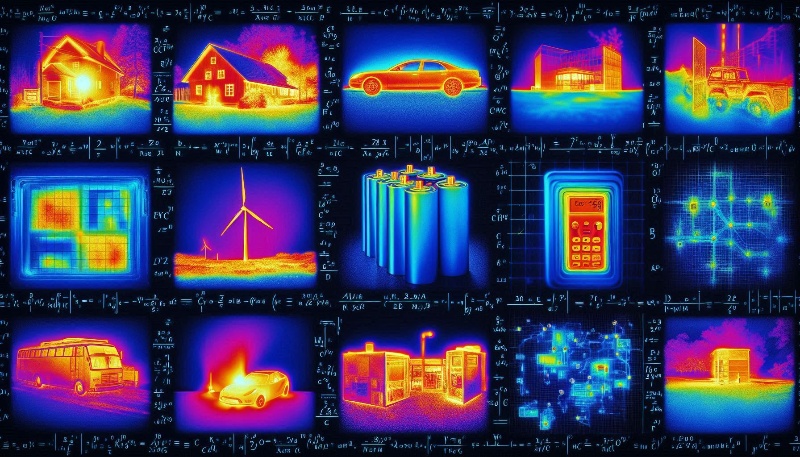- Energi och värme
- Gaslagar
- Termodynamikens 1:a och 2:a huvudsats, entropi
- Termodynamiska processer, Carnotprocessen, verkningsgrad och godhetstal
- Värmetransport (strålning, konvektion, värmeledning)
- Bose-Einstein, Fermi-Dirac och Maxwell-Boltzmanns fördelningar samt olika praktiska tillämpningar på dessa fördelningar (metaller, halvledare, strålning)
- Tillståndssumma, tillståndstäthet
- Fri energi, entalpi, Maxwellrelationer
- Jorden som ett termodynamiskt system
SK1119 Termodynamik och statistisk fysik 7,5 hp

Information per kursomgång
Välj termin och kursomgång för att se aktuell information och mer om kursen, såsom kursplan, studieperiod och anmälningsinformation.
Information för VT 2026 Start 2026-03-16 programstuderande
- Studielokalisering
KTH Campus
- Varaktighet
- 2026-03-16 - 2026-06-01
- Perioder
VT 2026: P4 (7.5 hp)
- Studietakt
50%
- Anmälningskod
60781
- Undervisningsform
Normal Dagtid
- Undervisningsspråk
Svenska
- Kurs-PM
- Kurs-PM är inte publicerat
- Antal platser
Min: 25
- Målgrupp
- Endast öppen för CELTE2 och CELTE3
- Planerade schemamoduler
- [object Object]
- Schema
Kontakt
Kursplan som PDF
Notera: all information från kursplanen visas i tillgängligt format på denna sida.
Kursplan SK1119 (VT 2023–)Innehåll och lärandemål
Kursinnehåll
Lärandemål
Kursen ger de grundläggande kunskaper och färdigheter inom termodynamik och statistisk fysik som en elektroingenjör kan behöva och som krävs för att få påbörja ett masterprogram inom ett fysikrelateratämnesområde. Studenterna ska kunna utnyttja sina kunskaper för att lösa grundläggande praktiskt orienterade problem inom området.
Efter fullgjord kurs ska studenterna kunna:
- redogöra för begreppet energi samt hur energi lagras och omvandlas mellan olika former vid termodynamiska processer.
- tillämpa idealiserade termodynamiska processer (isokor, isobar, isoterm och adiabat) både enskilt och såsom sammansatta i en termodynamisk kretsprocess.
- behärska termodynamikens första och andra huvudsats samt kunna utnyttja detta vid beräkningar av energi och entropi.
- relatera energiflöden i termodynamiska kretsprocesser till verkningsgraden hos motorer samt till godhetstal hos värmepumpar och kylmaskiner samt utföra beräkningar på detta.
- genomföra beräkningar på värmetransportproblem (strålning, konvektion, värmeledning).
- beskriva kopplingen mellan makroskopiska termodynamiska storheter och den statistiska fysikens beskrivning av motsvarande fenomen.
- tillämpa statistiska fördelningar inom olika relevanta områden för en elektroingenjör (till exempel elektriska ledare, halvledare, strålning).
- vara bekanta med grundläggande begrepp inom statistisk fysik.
- beskriva de termodynamiska aspekterna av hållbar utveckling.
- vara bekant med simuleringar av fysikaliska problem.
Kurslitteratur och förberedelser
Särskild behörighet
- Grundläggande fysik (motsvarande SK1108)
- Matematisk analys i flera variabler (motsvarande SF1626)
- Statistik (Aktivt deltangande i SF1920 Sannolighetsteori och statistik eller motsvarande)
Kurslitteratur
Examination och slutförande
Betygsskala
Examination
- PRO1 - Projektuppgift, 1,5 hp, betygsskala: P, F
- TEN1 - Tentamen, 6,0 hp, betygsskala: A, B, C, D, E, FX, F
Examinator beslutar, baserat på rekommendation från KTH:s handläggare av stöd till studenter med funktionsnedsättning, om eventuell anpassad examination för studenter med dokumenterad, varaktig funktionsnedsättning.
Examinator får medge annan examinationsform vid omexamination av enstaka studenter.
När kurs inte längre ges har student möjlighet att examineras under ytterligare två läsår.
Övriga krav för slutbetyg
Godkänt betyg på tentamen och projektuppgift
Examinator
Etiskt förhållningssätt
- Vid grupparbete har alla i gruppen ansvar för gruppens arbete.
- Vid examination ska varje student ärligt redovisa hjälp som erhållits och källor som använts.
- Vid muntlig examination ska varje student kunna redogöra för hela uppgiften och hela lösningen.